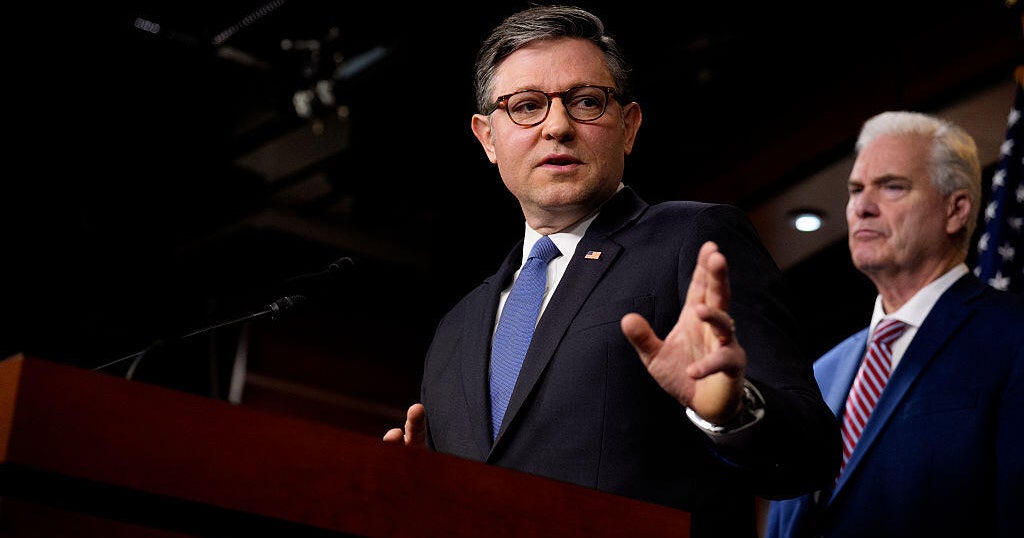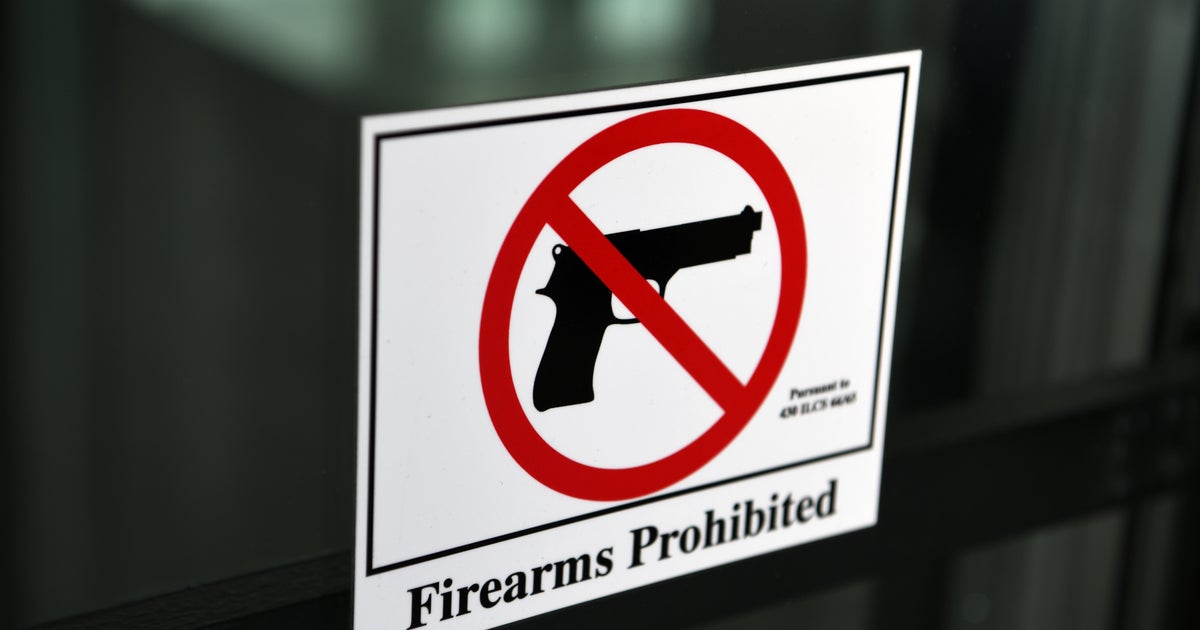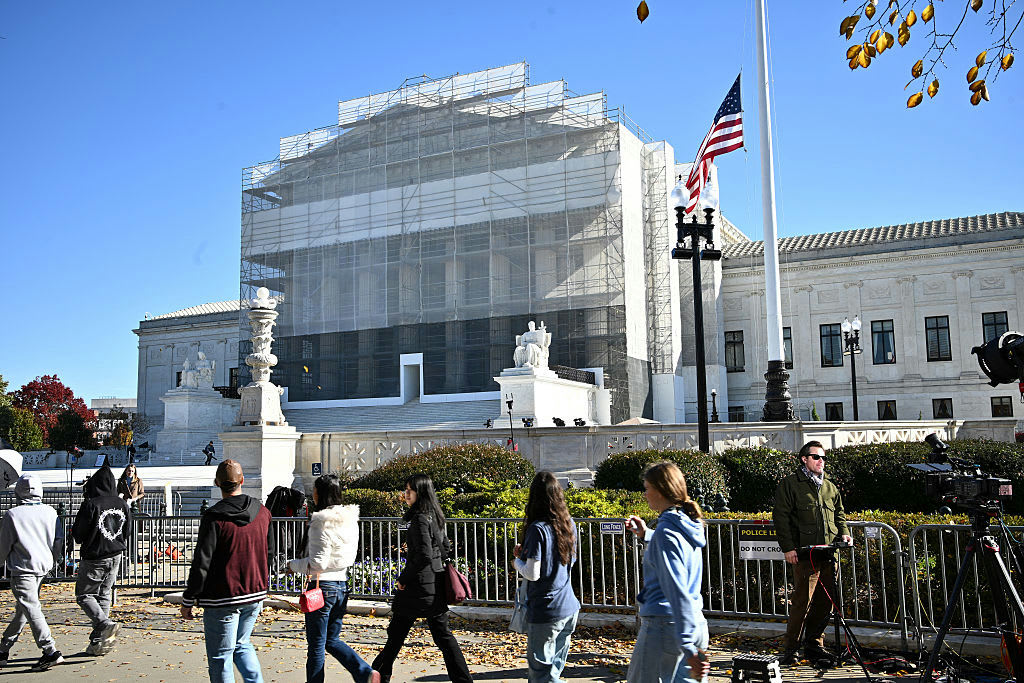Supreme Court weighs whether to enter gun debate amid calls for stricter limits
Washington — A pair of mass shootings in Georgia and Colorado last month thrust gun control back to the forefront of public debate, with Democrats in Congress and President Biden calling for swift legislative action.
But amid the public outcry over gun violence, the Supreme Court's nine members are meeting behind closed doors to discuss whether to add to next term's docket disputes over gun regulations, with a ruling from the justices potentially having far-reaching implications for firearms restrictions at the federal and state levels.
The high court could say as soon as mid-April whether it will hear cases involving the constitutionality of licenses to carry concealed handguns in public or the rights of convicted felons to possess firearms, and gun rights supporters — and some of the justices themselves — argue the Supreme Court is long overdue to define the reach of the Second Amendment.
"[T]he nation is split, with the Second Amendment alive and well in the vast middle of the nation, and those same rights disregarded near the coasts," Paul Clement, the former solicitor general who is representing gun owners challenging New York's licensing rules, told the Supreme Court in a filing last month. "Whatever else the framers intended in enshrining the Second Amendment in our charter of fundamental freedoms and guaranteeing rights to 'keep and bear arms' to all 'the people,' it was not to tolerate a nation divided on an issue this significant."
Already scheduled for discussion by the justices at two of its closed-door conferences, the case out of New York involves the state's ban on carrying concealed handguns in public without a license. But to obtain a license, an applicant must demonstrate a "proper cause" and "special need for self-protection distinguishable from that of the general community or of persons engaged in the same profession."
Two New York residents, joined by the New York State Rifle and Pistol Association, challenged the ban after their applications to obtain a license to carry a concealed handgun in public were denied. The gun owners argue the law is an infringement on their Second Amendment right to bear arms, but the lower courts have upheld the rules.
Now, they have asked the Supreme Court to decide whether the Second Amendment allows the government to prohibit citizens from carrying concealed handguns outside the home for self-defense.
"Many people in America are hoping finally there will be legislative action taken on gun violence prevention. Meanwhile, it looks like the court is going to go in the direction of making it harder to regulate guns," Hannah Shearer, litigation director at the Giffords Law Center, told CBS News. "It's a key piece of the conversation that maybe hasn't gotten as much attention."
It has been a decade since the Supreme Court issued its last landmark rulings in Second Amendment disputes, much to the chagrin of gun rights advocates who argue further action addressing the scope of the Second Amendment is needed.
In 2008, the Supreme Court ruled the Second Amendment protects the right to have firearms in the home for self-defense, and in 2010, the court said the right to bear arms applies to the states. While the Supreme Court in 2019 heard arguments in a challenge to a New York City rule restricting where licensed handgun owners could transport their locked and unloaded firearms, the justices tossed out the case last year after the limits at issue were changed.
The Supreme Court then spurned a host of challenges to state gun restrictions in June, though many believe the decade-long wait for a ruling could be coming to a close.
Shearer said the high court's reluctance in its last term to accept a Second Amendment case could have hinged on Chief Justice John Roberts, whose fifth vote to strike down a challenged rule may not have been a sure thing. But the appointment of Justice Amy Coney Barrett to fill the late Justice Ruth Bader Ginsburg's seat diluted Roberts' influence, as the court's conservative majority grew to 6-3.
"Now that Justice Barrett is on the court as another reliable vote in the conservative direction on Second Amendment cases, that might mean the floodgates are open and the court starts to review Second Amendment decisions more openly," she said.
Jonathan Adler, a law professor at Case Western Reserve University, said he expects the next gun regulation to land before the Supreme Court to be an "outlier."
"The likelihood of a broad, sweeping gun decision that wipes out or curtains gun regulations nationwide is unlikely," he said.
Adler noted the New York City transport rule considered by the justices in 2019 was unlike other firearms regulations, and he predicted that even a ruling on carrying guns outside the home could be narrow, as the court's ruling in 2008's District of Columbia v. Heller was.
While advocates on both sides of the gun debate are expecting the Supreme Court to end its long drought and decide a Second Amendment case, the question remains whether it will be one involving concealed carry licensing rules, like the New York case, or the rights of convicted felons to possess firearms.
The justices are scheduled to discuss at their private conference next week the case of Ken Flick, a Georgia man convicted of criminal copyright violation and smuggling for importing counterfeit cassette tapes in 1987. Because of his felony convictions, Flick is barred under federal law from possessing firearms.
"[W]hile legislatures have wide latitude to define crimes and classify them as felonies, they are not free to cast people out from the Constitution's protection," lawyers for Flick told the Supreme Court in their petition urging the justices to hear the case.
Barrett's ascension to the Supreme Court could raise the likelihood the justices take up the dispute over felon disarmament, as she authored a dissent in 2019 while serving on the 7th U.S. Circuit Court of Appeals in a challenge involving the same law at issue in Flick's case.
That case, often cited during her confirmation hearing, involved Rickey Kanter, who pleaded guilty to one count of mail fraud and, because of his felony conviction, was prohibited from possessing a firearm under federal and Wisconsin law.
While the 7th Circuit said Kanter's challenge to the constitutionality of the federal law was "without merit," Barrett disagreed.
"Absent evidence that he either belongs to a dangerous category or bears individual markers of risk, permanently disqualifying Kanter from possessing a gun violates the Second Amendment," she wrote.
A Supreme Court decision on whether to address the scope of the Second Amendment comes as Democrats in Congress have renewed calls for more stringent gun laws following the shootings in the Atlanta-area and Boulder. While Mr. Biden has urged lawmakers to act, he is poised to announce Thursday executive action to curb violence.
Shearer noted any Supreme Court decision would apply to measures approved by lawmakers and could limit the legislative options open to not only Congress but also state legislatures.
"It's important for lawmakers and advocates to pay attention to what the court is doing and also know what regulations are still possible," she said. "Nobody so far has put forth any kind of persuasive interpretation that would not allow for background checks, which is the basic proposal in Congress. The Second Amendment shouldn't be a barrier to that no matter what the Supreme Court does."



